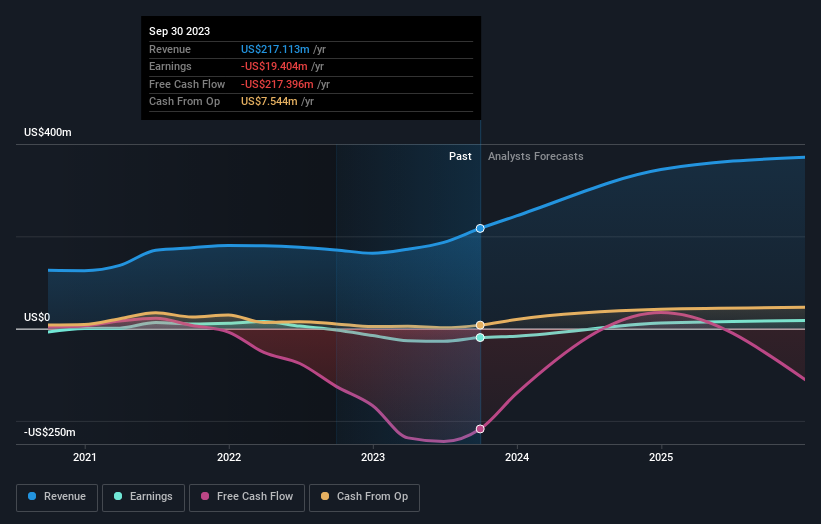While institutions own 40% of Full House Resorts, Inc. (NASDAQ:FLL), individual investors are its largest shareholders with 54% ownership
Key Insights
Full House Resorts' significant individual investors ownership suggests that the key decisions are influenced by shareholders from the larger public
A total of 25 investors have a majority stake in the company with 42% ownership
A look at the shareholders of Full House Resorts, Inc. (NASDAQ:FLL) can tell us which group is most powerful. And the group that holds the biggest piece of the pie are individual investors with 54% ownership. That is, the group stands to benefit the most if the stock rises (or lose the most if there is a downturn).
Institutions, on the other hand, account for 40% of the company's stockholders. Institutions will often hold stock in bigger companies, and we expect to see insiders owning a noticeable percentage of the smaller ones.
In the chart below, we zoom in on the different ownership groups of Full House Resorts.
Check out our latest analysis for Full House Resorts
What Does The Institutional Ownership Tell Us About Full House Resorts?
Institutional investors commonly compare their own returns to the returns of a commonly followed index. So they generally do consider buying larger companies that are included in the relevant benchmark index.
As you can see, institutional investors have a fair amount of stake in Full House Resorts. This implies the analysts working for those institutions have looked at the stock and they like it. But just like anyone else, they could be wrong. When multiple institutions own a stock, there's always a risk that they are in a 'crowded trade'. When such a trade goes wrong, multiple parties may compete to sell stock fast. This risk is higher in a company without a history of growth. You can see Full House Resorts' historic earnings and revenue below, but keep in mind there's always more to the story.
We note that hedge funds don't have a meaningful investment in Full House Resorts. BlackRock, Inc. is currently the company's largest shareholder with 5.9% of shares outstanding. The Vanguard Group, Inc. is the second largest shareholder owning 5.2% of common stock, and Daniel Lee holds about 4.0% of the company stock. Daniel Lee, who is the third-largest shareholder, also happens to hold the title of Member of the Board of Directors.
On studying our ownership data, we found that 25 of the top shareholders collectively own less than 50% of the share register, implying that no single individual has a majority interest.
Researching institutional ownership is a good way to gauge and filter a stock's expected performance. The same can be achieved by studying analyst sentiments. Quite a few analysts cover the stock, so you could look into forecast growth quite easily.
Insider Ownership Of Full House Resorts
While the precise definition of an insider can be subjective, almost everyone considers board members to be insiders. Company management run the business, but the CEO will answer to the board, even if he or she is a member of it.
Most consider insider ownership a positive because it can indicate the board is well aligned with other shareholders. However, on some occasions too much power is concentrated within this group.
We can report that insiders do own shares in Full House Resorts, Inc.. In their own names, insiders own US$10m worth of stock in the US$163m company. Some would say this shows alignment of interests between shareholders and the board, though we generally prefer to see bigger insider holdings. But it might be worth checking if those insiders have been selling.
General Public Ownership
The general public -- including retail investors -- own 54% of Full House Resorts. This level of ownership gives investors from the wider public some power to sway key policy decisions such as board composition, executive compensation, and the dividend payout ratio.
Next Steps:
It's always worth thinking about the different groups who own shares in a company. But to understand Full House Resorts better, we need to consider many other factors. Consider for instance, the ever-present spectre of investment risk. We've identified 1 warning sign with Full House Resorts , and understanding them should be part of your investment process.
If you would prefer discover what analysts are predicting in terms of future growth, do not miss this free report on analyst forecasts.
NB: Figures in this article are calculated using data from the last twelve months, which refer to the 12-month period ending on the last date of the month the financial statement is dated. This may not be consistent with full year annual report figures.
Have feedback on this article? Concerned about the content? Get in touch with us directly. Alternatively, email editorial-team (at) simplywallst.com.
This article by Simply Wall St is general in nature. We provide commentary based on historical data and analyst forecasts only using an unbiased methodology and our articles are not intended to be financial advice. It does not constitute a recommendation to buy or sell any stock, and does not take account of your objectives, or your financial situation. We aim to bring you long-term focused analysis driven by fundamental data. Note that our analysis may not factor in the latest price-sensitive company announcements or qualitative material. Simply Wall St has no position in any stocks mentioned.


